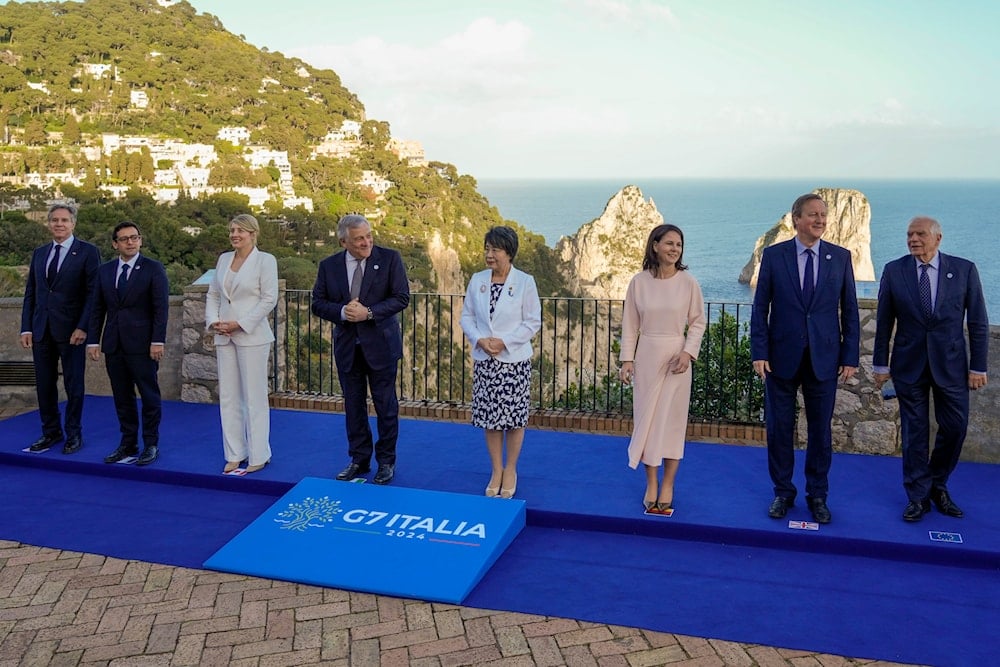Berlin opposes seizure of Russian assets, fears reparation claims: WSJ
A report by the Wall Street Journal reveals why Germany is hesitant about backing plans to seize Russian frozen assets according to German officials.
-

US Secretary of State Blinken, French FM Sejourne, Canada's FM Joly, Italian FM Tajani, Japan's FM Yoko, German FM Annalena Baerbock, UK's David Cameron, and EU chief Josep Borrell at the G7 of foreign Ministers in Capri, Italy, April 18, 2024 (AP)
As US-led efforts have been invested in a plan of confiscating frozen Russian assets due to its ongoing conflict with Ukraine, Germany has become one of the prominent countries in opposition to this plan, according to German officials cited by The Wall Street Journal today.
Why?
The country is concerned about facing new claims for reparations regarding crimes it committed during World War II, as seizing around $300 billion in Russian central bank funds could cause the emergence of a precedent paving the way for the former, according to what officials told the WSJ.
Around $1.3 trillion of reparation obligations, as estimated by Poland, have been the center of a dispute between it and Germany. Such lawsuits might possibly extend to reach other G7 countries due to losses accumulated through centuries of colonial exploitation and slavery as reported by the WSJ.
Based on the WSJ report, the officials said that according to Germany's own set of rules, state-owned assets are immune to foreign seizure so backing the US and EU plan to seize frozen Russian assets, will go against those rules.
Russia to defend its interests if its assets were seized: Kremlin
The seizure of Russian assets would be a nail in the Western economic system's coffin, Kremlin spokesperson Dmitry Peskov said today.
In a presser, Peskov underlined that foreign investors and governments holding their assets in the West will start contemplating it a dozen times before investing their money because confidentiality will disappear overnight under a single foolish and uncalculated decision that would trigger decades of recovery.
On Russia's reaction to the West seizing its assets, the Russian official said, "It is too early to discuss this, but Russia has Western assets from various structures," affirming that the country would indefinitely defend its interests, including by going to court.
In the same context, Russian Foreign Ministry spokesperson Maria Zakharova said Russia rejects the possibility of exchanging new Russian Federation regions for its frozen assets.
This comes after Germany suggested that Russia's assets remain frozen to be used as leverage in negotiations to end the war between both Ukraine and Russia and force Russia to forego the Russian Federation regions, according to the Wall Street Journal.
"I don't know who claims what, but assets cannot be exchanged for territory. We do not sell our homeland. And Russian assets must remain inviolable, otherwise Western theft will be met with a harsh response. And many in the West have already realized this, but it's a pity that not all of them," Zakharova said on Telegram.
Western countries have now frozen around $300 billion of the Russian central bank's assets and reserves that were held in their jurisdictions after the start of the war in Ukraine. The use of Russian assets to fund the Ukrainian regime without legal justification has even spurred criticism from the director of the International Monetary Fund (IMF) European Department, Alfred Kammer.

 3 Min Read
3 Min Read









